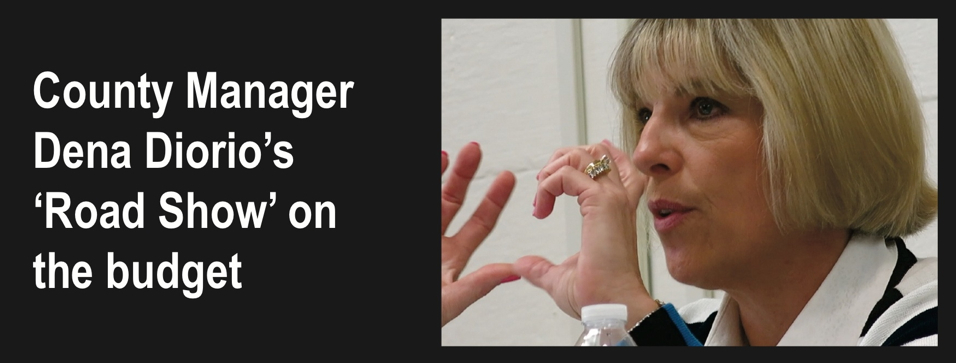
Breakfast
Forum
Charlotte, NC
tuesdayforumcharlotte.org
Home ● Where We Meet ● News ● Announcements ● Events ● About Us ● Contact Us ● Search ●

New County Manager discusses budget process, steers clear of issues
May 13, 2014
Dena Diorio brought a prepared text with her, but apparently few positions she wanted to stake out for herself, when she addressed the Forum today on the county's current budget process.
She described her budget "road show" as an investment in listening. And perhaps she got an earful, mostly about how questioners were angry with both state and local officials over inadequate education funding. Diorio responded at one point that she hadn't heard anyone asking that their taxes be raised to pay for more education funding.
Diorio's background is in public government finance, not politics. She deferred to elected officials whenever questioners expressed displeasure with how state and local governments operate, how they split up the governing tasks, how they raise money, how charter schools are set up.
Diorio�s predecessor, Harry Jones, had lived among and gone to church with many of the people in the room for decades, and many people in the room were deeply upset when he was fired. She steered clear of all that as well, offering nothing about her personal journey that might have built bridges to a disaffected community.
In front of a room packed with education advocates looking for another education advocate, she reminded the audience of the county�s other funding obligations. In a forum so accustomed to lengthy speeches both from questioners and answerers that all comments are timed, Diorio�s comments were clipped and primarily informational.
The presentation recalled the comment attributed to her husband Robert, and quoted in a January 2014 Observer story, on the occasion of her being chosen as county manager: �The commissioners are the elected officials and she understands that it�s their show.�
Below are videos from the Tuesday presentation. First
is Diorio's introductory statement. Following that are excerpts from the Q&A
that followed. A camera malfunction left about the last 15 minutes of the
Q&A unrecorded.
Q&A, Part 1 Questions asked in the video below:
Q: Why would you wnat to cut property taxes when there are so many needs, in
parks and such? Is this a political move?
Q: What would be your recommendation on funding the work of nonprofits?
Q: Why would you not want to support an N.C. law change to allow direct
taxpayer support of the school system?
Q: Is there anything in your budget that addresses ethnic disparities in
Mecklenburg?
Q: A 3% raise for a new teacher works out to less than $100 before taxes.
Why would you not give an additional 3% supplement to these teachers?
Q: Your job is to make CMS pay competitive with surrounding school
districts. How are you going to do that?
Q: Does the county budget for the tax losses when it makes deals to lure new
companies to the community?
Q: Would you identify where in the county the impacts of growth are being
felt?
Q: Wake County has a capital budget of $890 million. Mecklenburg has only
$290 million. Can you explain the difference?
Q: Mecklenburg is No. 1 in the state in terms of property tax rate, but only
No. 13 in terms of per-pupil spending. Why?
Q: Are there cost-of-living adjustments for your employees, and who controls
the rate?
Q&A, Part 2 Questions asked in the video below:
Q: What could we do to change the current reality of having the highest
property tax burden bur far from the top per-pupil support of education?
Q: Is more privatization ahead for behavioral services, in the wake of the
end of MeckLink?
Q: What steps are being taken to investigate using existing authority to
raise the sales tax, and use that money for education?
Q: Please describe Gov. McCrory�s teacher-pay proposal so we can help with
that.
Q: Have you had time to examine what we are doing in recreation to help
children?
Q: My home was not inspected, we couldn�t get the building codes enforced,
and we are not alone. As the city studies its ethics, is the county doing so
as well?
Q: Are there alternate tools for raising money? Could we use impact fees?
Q: We�ve privatived way too many public services. Is this a trend that can
be reversed?
Q: Do we do anything on the local level to give service to our veterans?
Q: The tasks of city, county and school authorities overlap, but silos can
be a problem. Is there movement toward creating intergovernmental
cooperation?
Q: What are you thinking about how the surplus could be used. Could
education be a part of that?
Q: There�s a lot of talk about city-county consolidation, and the
efficiencies that might result. Can you talk about that?